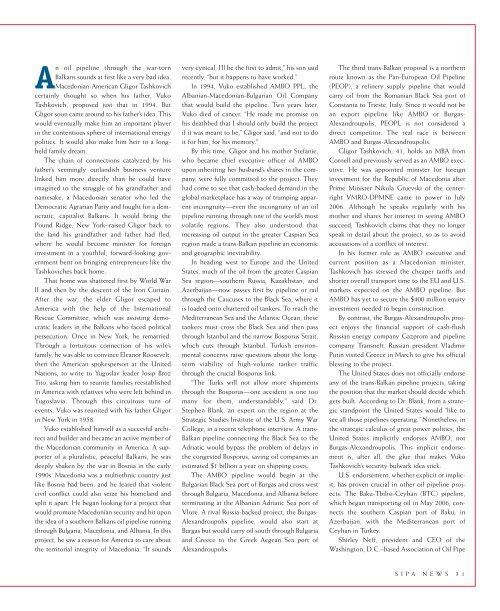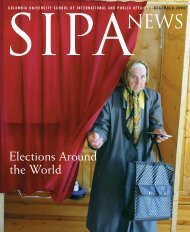The Energy Issue - School of International and Public Affairs ...
The Energy Issue - School of International and Public Affairs ...
The Energy Issue - School of International and Public Affairs ...
You also want an ePaper? Increase the reach of your titles
YUMPU automatically turns print PDFs into web optimized ePapers that Google loves.
An oil pipeline through the war-torn<br />
Balkans sounds at first like a very bad idea.<br />
Macedonian-American Gligor Tashkovich<br />
certainly thought so when his father, Vuko<br />
Tashkovich, proposed just that in 1994. But<br />
Gligor soon came around to his father’s idea. This<br />
would eventually make him an important player<br />
in the contentious sphere <strong>of</strong> international energy<br />
politics. It would also make him heir to a longheld<br />
family dream.<br />
<strong>The</strong> chain <strong>of</strong> connections catalyzed by his<br />
father’s seemingly outl<strong>and</strong>ish business venture<br />
linked him more directly than he could have<br />
imagined to the struggle <strong>of</strong> his gr<strong>and</strong>father <strong>and</strong><br />
namesake, a Macedonian senator who led the<br />
Democratic Agrarian Party <strong>and</strong> fought for a democratic,<br />
capitalist Balkans. It would bring the<br />
Pound Ridge, New York–raised Gligor back to<br />
the l<strong>and</strong> his gr<strong>and</strong>father <strong>and</strong> father had fled,<br />
where he would become minister for foreign<br />
investment in a youthful, forward-looking government<br />
bent on bringing entrepreneurs like the<br />
Tashkoviches back home.<br />
That home was shattered first by World War<br />
II <strong>and</strong> then by the descent <strong>of</strong> the Iron Curtain.<br />
After the war, the elder Gligor escaped to<br />
America with the help <strong>of</strong> the <strong>International</strong><br />
Rescue Committee, which was assisting democratic<br />
leaders in the Balkans who faced political<br />
persecution. Once in New York, he remarried.<br />
Through a fortuitous connection <strong>of</strong> his wife’s<br />
family, he was able to convince Eleanor Roosevelt,<br />
then the American spokesperson at the United<br />
Nations, to write to Yugoslav leader Josip Broz<br />
Tito, asking him to reunite families reestablished<br />
in America with relatives who were left behind in<br />
Yugoslavia. Through this circuitous turn <strong>of</strong><br />
events, Vuko was reunited with his father Gligor<br />
in New York in 1958.<br />
Vuko established himself as a succesful architect<br />
<strong>and</strong> builder <strong>and</strong> became an active member <strong>of</strong><br />
the Macedonian community in America. A supporter<br />
<strong>of</strong> a pluralistic, peaceful Balkans, he was<br />
deeply shaken by the war in Bosnia in the early<br />
1990s. Macedonia was a multiethnic country just<br />
like Bosnia had been, <strong>and</strong> he feared that violent<br />
civil conflict could also seize his homel<strong>and</strong> <strong>and</strong><br />
split it apart. He began looking for a project that<br />
would promote Macedonian security <strong>and</strong> hit upon<br />
the idea <strong>of</strong> a southern Balkans oil pipeline running<br />
through Bulgaria, Macedonia, <strong>and</strong> Albania. In this<br />
project, he saw a reason for America to care about<br />
the territorial integrity <strong>of</strong> Macedonia. “It sounds<br />
very cynical, I’ll be the first to admit,” his son said<br />
recently, “but it happens to have worked.”<br />
In 1994, Vuko established AMBO PPL, the<br />
Albanian-Macedonian-Bulgarian Oil Company<br />
that would build the pipeline. Two years later,<br />
Vuko died <strong>of</strong> cancer. “He made me promise on<br />
his deathbed that I should only build the project<br />
if it was meant to be,” Gligor said, “<strong>and</strong> not to do<br />
it for him, for his memory.”<br />
By this time, Gligor <strong>and</strong> his mother Stefanie,<br />
who became chief executive <strong>of</strong>ficer <strong>of</strong> AMBO<br />
upon inheriting her husb<strong>and</strong>’s shares in the company,<br />
were fully committed to the project. <strong>The</strong>y<br />
had come to see that cash-backed dem<strong>and</strong> in the<br />
global marketplace has a way <strong>of</strong> trumping apparent<br />
incongruity—even the incongruity <strong>of</strong> an oil<br />
pipeline running through one <strong>of</strong> the world’s most<br />
volatile regions. <strong>The</strong>y also understood that<br />
increasing oil output in the greater Caspian Sea<br />
region made a trans-Balkan pipeline an economic<br />
<strong>and</strong> geographic inevitability.<br />
In heading west to Europe <strong>and</strong> the United<br />
States, much <strong>of</strong> the oil from the greater Caspian<br />
Sea region—southern Russia, Kazakhstan, <strong>and</strong><br />
Azerbaijan—now passes first by pipeline or rail<br />
through the Caucuses to the Black Sea, where it<br />
is loaded onto chartered oil tankers. To reach the<br />
Mediterranean Sea <strong>and</strong> the Atlantic Ocean, these<br />
tankers must cross the Black Sea <strong>and</strong> then pass<br />
through Istanbul <strong>and</strong> the narrow Bosporus Strait,<br />
which cuts through Istanbul. Turkish environmental<br />
concerns raise questions about the longterm<br />
viability <strong>of</strong> high-volume tanker traffic<br />
through the crucial Bosporus link.<br />
“<strong>The</strong> Turks will not allow more shipments<br />
through the Bosporus—one accident is one too<br />
many for them, underst<strong>and</strong>ably,” said Dr.<br />
Stephen Blank, an expert on the region at the<br />
Strategic Studies Institute <strong>of</strong> the U.S. Army War<br />
College, in a recent telephone interview. A trans-<br />
Balkan pipeline connecting the Black Sea to the<br />
Adriatic would bypass the problem <strong>of</strong> delays in<br />
the congested Bosporus, saving oil companies an<br />
estimated $1 billion a year on shipping costs.<br />
<strong>The</strong> AMBO pipeline would begin at the<br />
Bulgarian Black Sea port <strong>of</strong> Burgas <strong>and</strong> cross west<br />
through Bulgaria, Macedonia, <strong>and</strong> Albania before<br />
terminating at the Albanian Adriatic Sea port <strong>of</strong><br />
Vlore. A rival Russia-backed project, the Burgas-<br />
Alex<strong>and</strong>roupolis pipeline, would also start at<br />
Burgas but would carry oil south through Bulgaria<br />
<strong>and</strong> Greece to the Greek Aegean Sea port <strong>of</strong><br />
Alex<strong>and</strong>roupolis.<br />
<strong>The</strong> third trans-Balkan proposal is a northern<br />
route known as the Pan-European Oil Pipeline<br />
(PEOP), a refinery supply pipeline that would<br />
carry oil from the Romanian Black Sea port <strong>of</strong><br />
Constanta to Trieste, Italy. Since it would not be<br />
an export pipeline like AMBO or Burgas-<br />
Alex<strong>and</strong>roupolis, PEOPL is not considered a<br />
direct competitor. <strong>The</strong> real race is between<br />
AMBO <strong>and</strong> Burgas-Alex<strong>and</strong>roupolis.<br />
Gligor Tashkovich, 41, holds an MBA from<br />
Cornell <strong>and</strong> previously served as an AMBO executive.<br />
He was appointed minister for foreign<br />
investment for the Republic <strong>of</strong> Macedonia after<br />
Prime Minister Nikola Gruevski <strong>of</strong> the centerright<br />
VMRO-DPMNE came to power in July<br />
2006. Although he speaks regularly with his<br />
mother <strong>and</strong> shares her interest in seeing AMBO<br />
succeed, Tashkovich claims that they no longer<br />
speak in detail about the project, so as to avoid<br />
accusations <strong>of</strong> a conflict <strong>of</strong> interest.<br />
In his former role as AMBO executive <strong>and</strong><br />
current position as a Macedonian minister,<br />
Tashkovich has stressed the cheaper tariffs <strong>and</strong><br />
shorter overall transport time to the EU <strong>and</strong> U.S.<br />
markets expected on the AMBO pipeline. But<br />
AMBO has yet to secure the $400 million equity<br />
investment needed to begin construction.<br />
By contrast, the Burgas-Alex<strong>and</strong>roupolis project<br />
enjoys the financial support <strong>of</strong> cash-flush<br />
Russian energy company Gazprom <strong>and</strong> pipeline<br />
company Transneft. Russian president Vladimir<br />
Putin visited Greece in March to give his <strong>of</strong>ficial<br />
blessing to the project.<br />
<strong>The</strong> United States does not <strong>of</strong>ficially endorse<br />
any <strong>of</strong> the trans-Balkan pipeline projects, taking<br />
the position that the market should decide which<br />
gets built. According to Dr. Blank, from a strategic<br />
st<strong>and</strong>point the United States would “like to<br />
see all those pipelines operating.” Nonetheless, in<br />
the strategic calculus <strong>of</strong> great power politics, the<br />
United States implicitly endorses AMBO, not<br />
Burgas-Alex<strong>and</strong>roupolis. This implicit endorsement<br />
is, after all, the glue that makes Vuko<br />
Tashkovich’s security bulwark idea stick.<br />
U.S. endorsement, whether explicit or implicit,<br />
has proven crucial in other oil pipeline projects.<br />
<strong>The</strong> Baku-Tbilisi-Ceyhan (BTC) pipeline,<br />
which began transporting oil in May 2006, connects<br />
the southern Caspian port <strong>of</strong> Baku, in<br />
Azerbaijan, with the Mediterranean port <strong>of</strong><br />
Ceyhan in Turkey.<br />
Shirley Neff, president <strong>and</strong> CEO <strong>of</strong> the<br />
Washington, D.C.–based Association <strong>of</strong> Oil Pipe<br />
SIPA NEWS 31

















